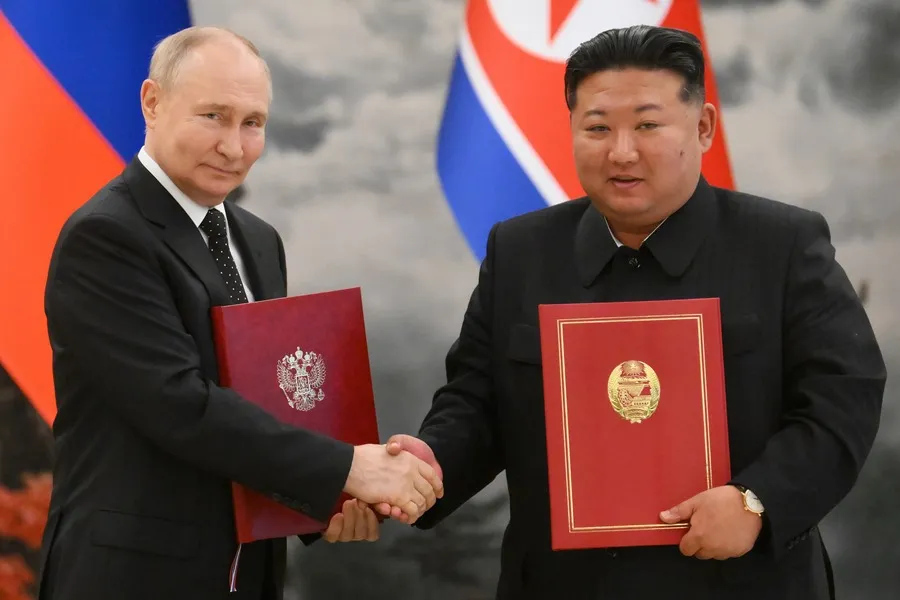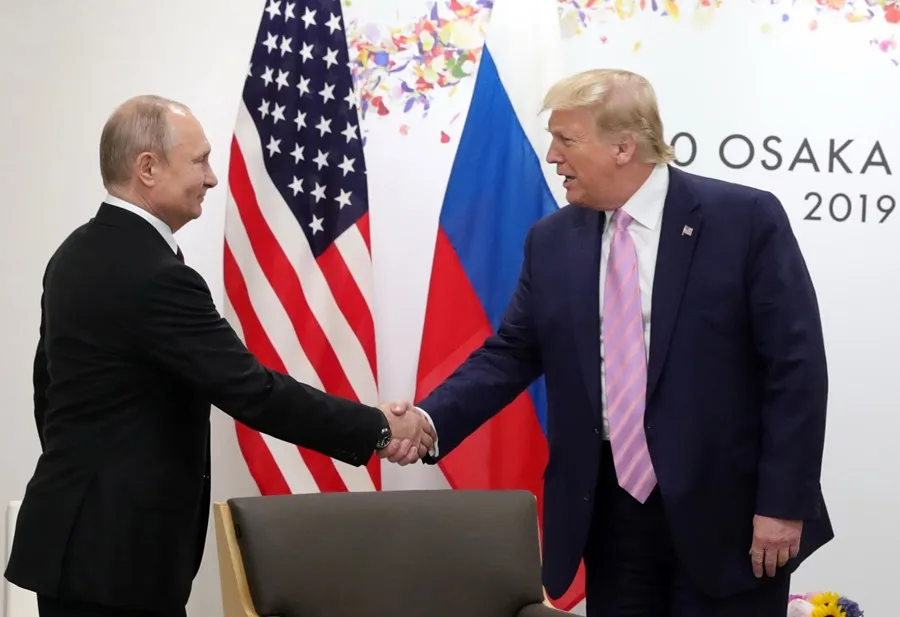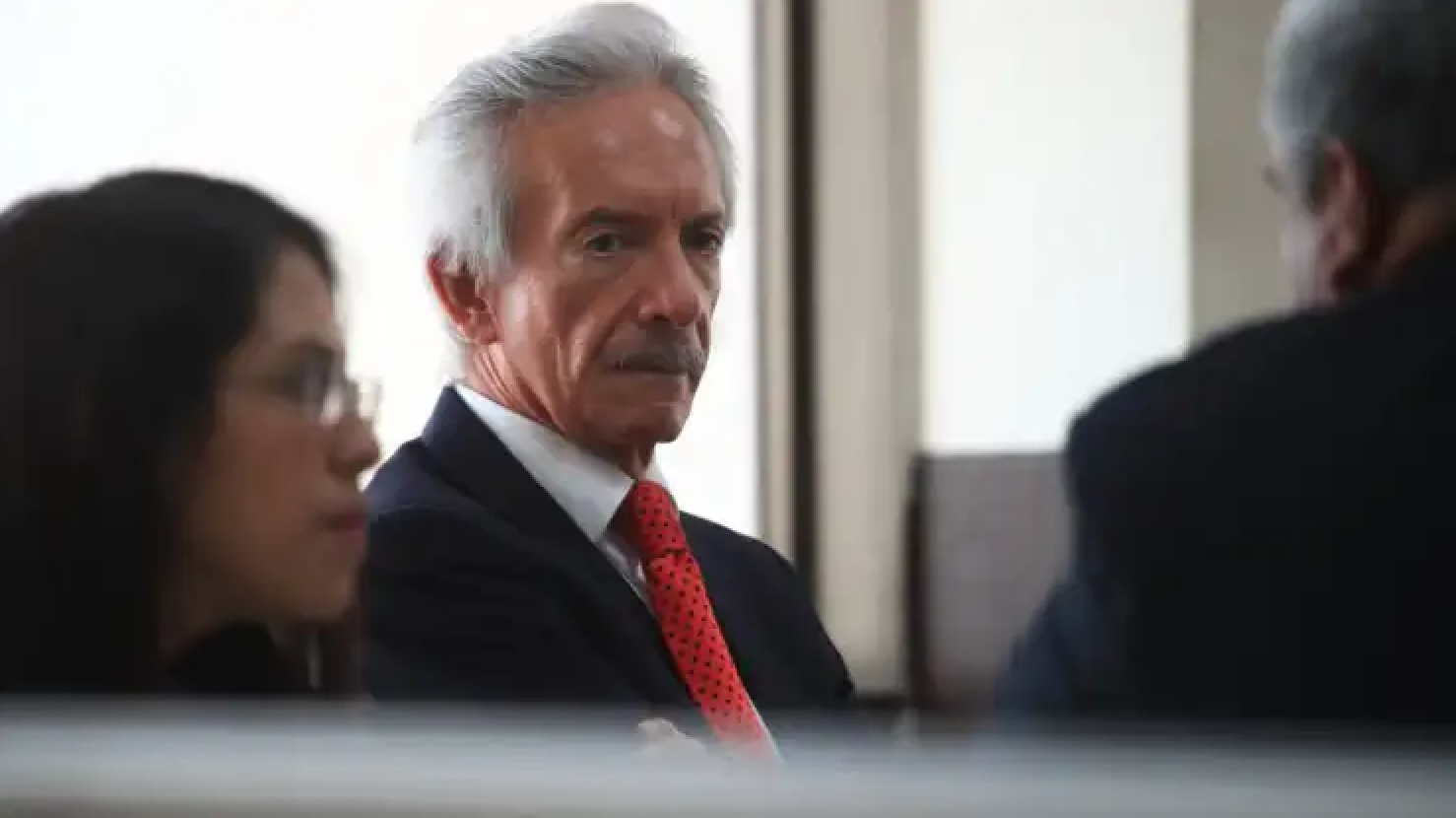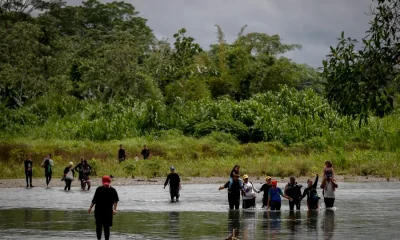International
The new Moscow-Pyonyang pact, a headache for the United States and allies… and for Beijing

Moscow and Pyongyang agreed to offer military assistance in case of aggression and paved the way for more defense exchanges, a movement that according to analysts leaves both Beijing, the greatest ally of both countries, and Seoul, Tokyo and Washington, in a complex situation, for which it raises the challenge.
The leaders of Russia and North Korea, Vladimir Putin and Kim Jong-un, signed the day before the so-called “Strategic Partnership Agreement,” the new road map for their bilateral relations that replaces previous diplomatic treaties, during the Kremlin president’s first visit to Pyongyang in 24 years.
Mutual military assistance in the face of an eventual attack is the most outstanding novelty of the document, with which Putin and Kim send a warning to the United States and its Asian allies – insisting that they abide by international law – and also redraw regional alliances under the watchful eye of Beijing.
“The pact means a renewal of the Cold War security guarantees considered deceased in 1990, when South Korea and Russia normalized relations,” said the American Victor Cha, former National Security Adser of the White House, through his account in X.
Cha, an analyst at the Center for Strategic and International Studies (CSIS) in Washington, also believes that the agreement will mean “an escalation in military cooperation,” including more supply of North Korean munitions and ballistic missiles for the war in Ukraine, and “a possible proliferation of the shipment of Russian advanced technology to North Korea.”
In addition to the potential impact on the conflict in Ukraine through the shipment of weapons that Washington, Seoul and other Western countries have been denouncing, the United States and its allies will now have to deal with formalized security ties between Moscow and Pyongyang.
Many analysts consider the mutual defense assistance clause precisely as a response to the largest military rapprochement between Washington, Seoul and Tokyo in recent years, including the collaboration of Japan and South Korea with NATO, and believe that it will also have the effect of pushing these three partners and other related countries to shield themselves even more against the Russian-North Korean axis.
“I think this will serve as a pretext to formalize the U.S.-Japan-South Korea trilateral security relationship in the context of next month’s NATO summit in Washington,” says Cha.
Other experts highlight that the pact signed by Putin and Kim highlights the weaknesses that both countries face under the extensive regime of sanctions that weighs on them, and question how far military assistance could go in the event of conflict.
“There is no credible mechanism or political will to fight for each other or to develop a joint military strategy,” Patrick Cronin, director of Asia-Pacific Security at the Hudson Institute, said in statements to the South Korean agency Yonhap.
“Yes, there is a mute desire to show solidarity in opposition to a world order led by the United States,” Cronin said.
Experts point to the possible influence of Beijing when it comes to seeing the true course of the new pact between Russia and North Korea, traditional Chinese allies and increasingly dependent on the Asian giant.
“It is likely that China is nervous. Pyongyang is prioritizing Moscow over Beijing because Russia seems willing to offer Kim more than China gives her,” says Sydney Seiler, a former U.S. intelligence analyst and currently a CSIS researcher.
Cha, for his part, points out the possibility of an upcoming summit between Xi Jinping and Kim “to balance and align positions,” and also recalls that the Chinese president held his last meeting with the North Korean dictator in June 2019, months after the latter’s failed summit with former US President Donald Trump.
Xi, who also faces increasing pressure from the West for his support for Moscow during the invasion of Ukraine, received Putin in Beijing in May at a summit in which they claimed to open “a new era” of their relations, and according to some information, asked the Russian leader not to travel to Pyongyang immediately after his passage through China.
Beijing for the moment has limited itself to pointing out that Moscow and Pyongyang “have the legitimate need for exchanges, cooperation and development of their relations as close and friendly neighbors,” according to Chinese Chancellor Lin Jian’s spokesman the day before.
International
Trump urges Putin to reach peace deal

On Monday, U.S. President Donald Trump reiterated his desire for Russian President Vladimir Putin to “reach a deal” to end the war in Ukraine, while also reaffirming his willingness to impose sanctions on Russia.
“I want to see him reach an agreement to prevent Russian, Ukrainian, and other people from dying,” Trump stated during a press conference in the Oval Office at the White House.
“I think he will. I don’t want to have to impose secondary tariffs on Russian oil,” the Republican leader added, recalling that he had already taken similar measures against Venezuela by sanctioning buyers of the South American country’s crude oil.
Trump also reiterated his frustration over Ukraine’s resistance to an agreement that would allow the United States to exploit natural resources in the country—a condition he set in negotiations to end the war.
International
Deportation flight lands in Venezuela; government denies criminal gang links

A flight carrying 175 Venezuelan migrants deported from the United States arrived in Caracas on Sunday. This marks the third group to return since repatriation flights resumed a week ago, and among them is an alleged member of a criminal organization, according to Venezuelan authorities.
Unlike previous flights operated by the Venezuelan state airline Conviasa, this time, an aircraft from the U.S. airline Eastern landed at Maiquetía Airport, on the outskirts of Caracas, shortly after 2:00 p.m. with the deportees.
Interior Minister Diosdado Cabello, who welcomed the returnees at the airport, stated that the 175 repatriated individuals were coming back “after being subjected, like all Venezuelans, to persecution” and dismissed claims that they belonged to the criminal organization El Tren de Aragua.
However, Cabello confirmed that “for the first time in these flights we have been carrying out, someone of significance wanted by Venezuelan justice has arrived, and he is not from El Tren de Aragua.” Instead, he belongs to a gang operating in the state of Trujillo. The minister did not disclose the individual’s identity or provide details on where he would be taken.
International
Son of journalist José Rubén Zamora condemns father’s return to prison as “illegal”

The son of renowned journalist José Rubén Zamora Marroquín, José Carlos Zamora, has denounced as “illegal” the court order that sent his father back to a Guatemalan prison on March 3, after already spending 819 days behind barsover a highly irregular money laundering case.
“My father’s return to prison was based on an arbitrary and illegal ruling. It is also alarming that the judge who had granted him house arrest received threats,” José Carlos Zamora told EFE in an interview on Saturday.
The 67-year-old journalist was sent back to prison inside the Mariscal Zavala military barracks on March 3, when Judge Erick García upheld a Court of Appeals ruling that overturned the house arrest granted to him in October. Zamora had already spent 819 days in prison over an alleged money laundering case.
His son condemned the situation as “unacceptable”, stating that the judge handling the case “cannot do his job in accordance with the law due to threats against his life.”
-

 Central America5 days ago
Central America5 days agoNicaragua denounces Costa Rica’s position in SICA as aligned with foreign interests
-

 Central America5 days ago
Central America5 days agoNicaragua’s new judicial law consolidates power in Ortega and Murillo’s hands
-

 Central America5 days ago
Central America5 days agoPanama’s president declares Darién gap ‘closed’ amid sharp drop in migrant flow
-

 International3 days ago
International3 days agoSon of journalist José Rubén Zamora condemns father’s return to prison as “illegal”
-

 International5 days ago
International5 days agoMarco Rubio warns Venezuela against military action against Guyana
-

 International3 days ago
International3 days agoMiyazaki’s style goes viral with AI but at what cost?
-

 Central America2 days ago
Central America2 days agoPanama police clarifies that Interpol alert for Martinelli is still pending
-

 International2 days ago
International2 days agoDeportation flight lands in Venezuela; government denies criminal gang links
-

 Central America16 hours ago
Central America16 hours agoU.S. Homeland Security Secretary urges Mexico to strengthen Guatemala border
-

 International16 hours ago
International16 hours agoTrump urges Putin to reach peace deal
-

 Central America16 hours ago
Central America16 hours agoPanama grants Martinelli 72-hour extension to travel to Nicaragua
-
Central America4 days ago
Nicaragua revokes legal status of 10 more NGOs, bringing total to over 5,600















